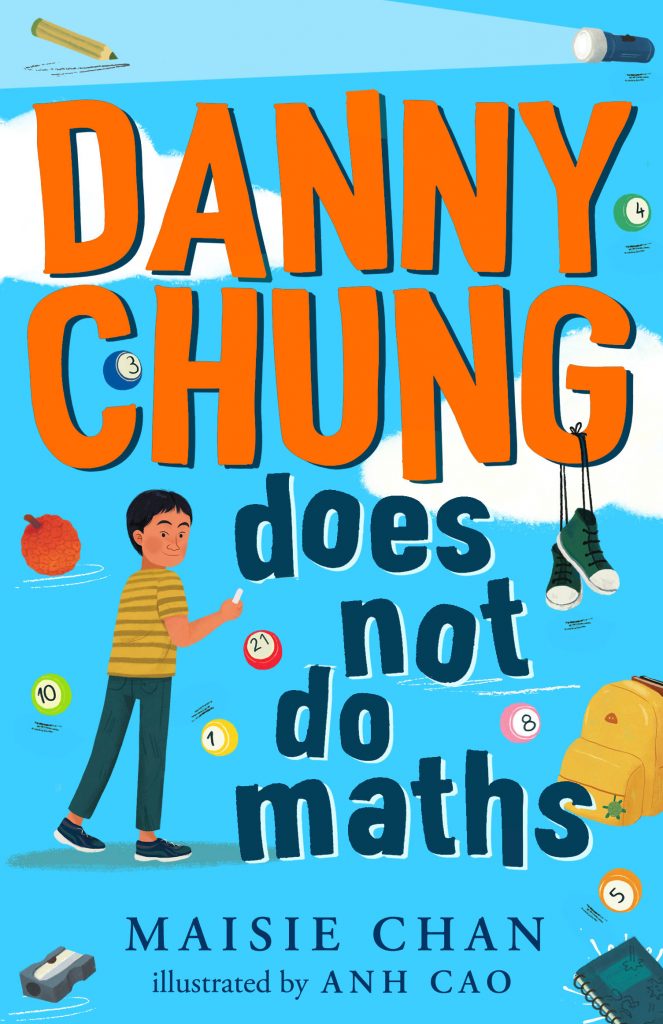
For years, the East Asians have been ranked among the top in the International Maths Olympiad. It is no wonder that this continuing success eventually leads many to assume that East Asians are good at maths. Well, although there is some truth in that stereotypical statement, it is still not entirely true. There are many prolific East Asian artists who have found success in their artistic and literary pursuits. As much as most traditional East Asian parents believe that arts enrich a child’s well-being, it is not a lucrative profession. But what if there is a positive correlation between arts and maths? That’s what British East Asian author Maisie Chan wants to explore in her latest children novel, Danny Chung Does Not Do Maths.
Danny Chung Does Not Do Maths is a delightful read. It’s funny, well-paced and heart-warming. The author invites us into the world of Danny Chung, a precocious eleven-year-old boy who loves drawing more than anything else. He would even hide under the duvet to draw his comic strips that document his daily life. His parents run a Chinese takeaway, Lucky Dragon, which is located in ‘one of Birmingham’s remote suburbs’, Longdale High Street. The only problem is, Danny hates maths and he has a maths project to complete at the end of his Easter holidays (yikes!). He is in for a surprise when his parents clean his bedroom one Saturday morning to make room for a bunk bed. Thinking he can finally invite his best friend and comic wingman, Ravi, for a sleepover, Danny happily makes plans for it. But his excitement dissipates when his surprise turns out to be a little, wrinkly, ex-maths champion grandmother from China. Nai Nai can’t speak a word of English. To Danny, she sounds like a ‘mixture between a baby singing and a frog’. Just when things can’t get any worse, Danny is tasked to look after her during the holidays while his parents are busy tending their takeaway shop.
Hilarity ensues when Nai Nai embarrasses Danny at a local grocer with her seed spitting antics and her surprise appearance at Danny’s school with her delicious braised chicken feet. Soon, he realises that both of them have more in common than he thought.
Throughout the novel, we are also introduced to the other Chinese family, the Yees, who live within five miles of each other. Clarissa Yee, also known as Auntie Yee to Danny, is the epitome of an Asian tiger mum. She sends her daughter, Amelia Yee, to a private school, various enrichment classes, and elevates her prized daughter on the pedestal. And Amelia doesn’t disappoint. She is a model Chinese high achiever who excels in both her studies and music. But beneath this intelligent and obedient façade lies a rebellious streak that is waiting to break free from her mother’s iron fist. Adrian Yee, also known as Uncle Yee, is an avuncular figure that Danny can relate to.
Illustrator Anh Cao does a wonderful job with Danny’s comic strips, which fits perfectly into the narrative. Likewise, there are many light-hearted moments to savour. One of them is the unlikely friendship forged between Mrs Cruikshanks and Nai Nai, and their bingo adventures. Despite not knowing each other’s native languages, their shared love for bingo is one that transcends all language barriers and often had me in stitches.
Essentially, the themes of love, hope, intergenerational relationships and friendships are universal. This is exactly what we need during this precarious time. Chan develops her characters well with each of them having a strong distinctive voice. Nai Nai is such an endearing character that I eventually fell in love with at the end of the story.
But ultimately, what Chan does really well in this novel is her inclusion of the Chinese culture. When Danny’s parents remind their son about respecting his elders and looking after them, it highlights how much first generation Chinese immigrant parents have a need to reinforce these Asian values, for fear that their second generation British-East Asian children might forget about them. Likewise, when Clarissa and Danny’s mother compare their children’s academic achievements and extra-curriculum activities, it is a common sight, which most East Asian children experience during growing up. Such one-upmanship and boasting only illustrates the inferiority of one’s parenting style and the need to save face.
I believe Chan hopes to debunk the stereotypical statement that East Asians are good at maths, but instead, see each child as an individual – one who is special in their unique way, and skills. Despite being a children’s book, it surprisingly rekindles my memories of growing up in a Chinese family and helps me to reconnect with my heritage. Danny Chung Does Not Do Maths is one of those children’s books that will make you laugh, cry, and tug your heartstrings.
Danny Chung Does Not Do Maths is now available at Waterstones, The Rocketship Bookshop, Amazon UK and Book Depository.
